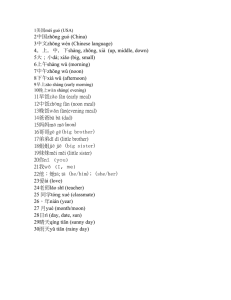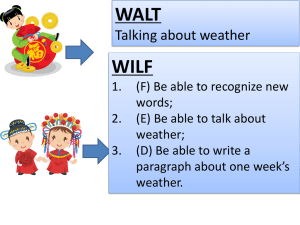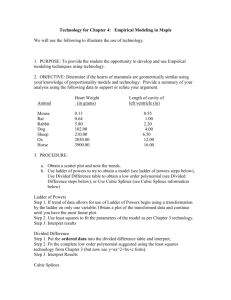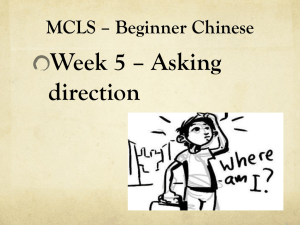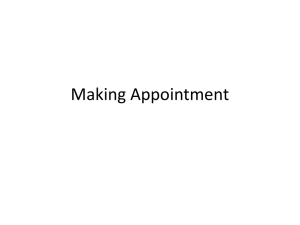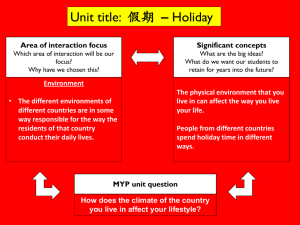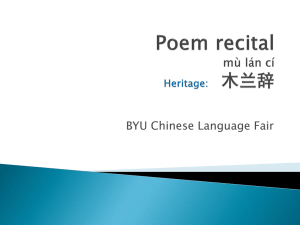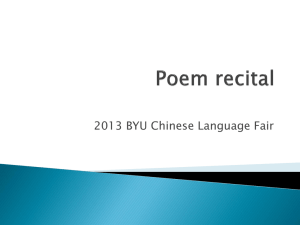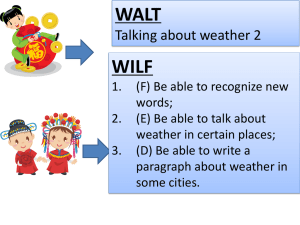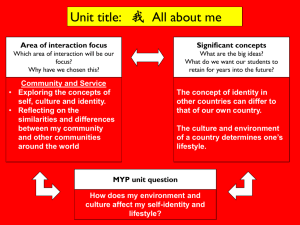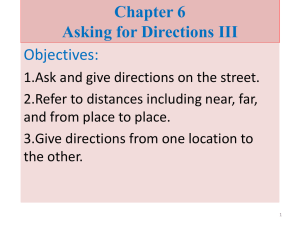这是什么科目 - Ms. Herford
advertisement
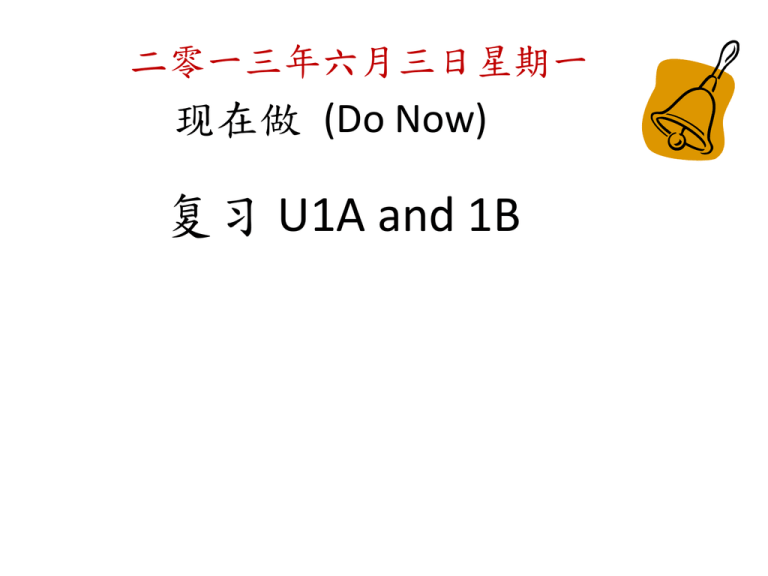
二零一三年六月三日星期一 现在做 (Do Now) 复习 U1A and 1B Self-Intro 自 我 介 绍 zì wǒ jiè shào Name Job Nationality Family Birthday/age Friends Hobbies 先(xiān)…,再(zài) …,然后(rán hòu) First……..……., then…..……, then…. • Sequence 我先上网,再聊天,然后休息。 我先唱歌,再听音乐,然后跳舞。 我喜欢先游泳,再打球,然后看电视。 一边(biān)…,一边(biān)… 看图说话(kàn tú shuō huà) 一边(biān)…,一边(biān)… 看图说话(kàn tú shuō huà) 在(zài; at, in, on) Combined with a noun, the preposition 在 indicates location. 我的书在这儿。 我喜欢在家看电影。 在: In, at, on; To indicate location 在 vs.再 zài 再:again; 再见! then; 先….., 再….. 语法(grammar point) VOV得 adjective We need 得 when we want to describe customary actions, which is when we want to say how somebody usually does something. For example, 他打球打得很好。 她看书看得快。 He plays ball play de very well. He plays ball very well. She reads book read de fast. She reads (book) fast. Q:你跳舞跳得怎么样? A:我跳舞跳得______________。 好 很好 棒极了(bàng jí le) 还可以 不好 Q:你游泳游得怎么样? A:我游泳游得______________。 好 快 慢 很好 棒极了(bàng jí le) 还可以 不好 Q:你跑步跑得怎么样? A:我跑步跑得______________。 好 快 慢 很好 棒极了(bàng jí le) 还可以 不好 这是什么? 天气 (tiān qì) Weather Turn to the other side: grammar A1 今天天气怎么样? How is today’s weather? 马马虎虎 还不错 不好 非常好 很好 好极了 还可以 太好了 今天天气______。 fēi cháng (tài) jí 气温 (qì wēn) air temperature 度 dù degree 气温几度? (qè wēn jĭ 101度 dù) 今天气温几度? What’s today’s temperature? 48 to 52 degree 今天气温四十八到五十二度 (qì wèn dào 到 = to; It indicates a range of numbers dù) 今天气温几度? What’s today’s temperature? around 40 degree 今天气温四十度左右。 左右 = around Turn to the other side 今天气温最高六十度, zuì gāo 最低五十度。 zuì dī 最高 最低 = highest = lowest 今天气温最高二十度, zuì gāo 最低零下三度。 zuì dī 零下 = below zero 说话练习 今天天气怎么样? 说话练习 今天气温几度? 60 degree 72 degree 55 degree around 60 degree around 72 degree around 55 degree 说话练习 今天气温几度? 20-30 degree 56-72 degree 45-55 degree Weather conditions 今天天气怎么样? 晴天 今天是______ (qíng tiān) Sunny day 今天天气怎么样? 阴天 今天是______ (yīn tiān) Cloudy day 今天天气怎么样? 雨天 今天是____ (yŭ tiān) raining day 今天天气怎么样? 多云 今天______ (duō yún) cloudy 今天天气怎么样? 下雨 今天会______ xià yŭ 会= will to rain 今天天气怎么样? 下小雨 下大雨 今天天气怎么样? 下雪xià xuĕ 今天______ to snow 今天天气怎么样? 下小雪 下大雪 今天天气怎么样? 刮风guā fēng 今天______ windy 今天天气怎么样? 台风( tái fēng) 今天有______ typhoon 今天天气怎么样? 打雷( dă léi) 今天______ thunder 天气预报说星期三会下雨。 预报(yù bào ) forecast report 暖和 凉快 今天天气很______。 (nuăn (liáng huó) kuài) warm cool 今天天气不好,适合在家睡觉。 今天天气很好,适合去打网球。 适合(shì hé) Is suited for U1B.2 Seasons 季节(jì jié) 这是什么? 季节(jì jié) seasons 这是什么季节? What season is this? 这是春天 chūn This is spring. 这是什么季节? What season is this? 这是夏天 xià This is summer. 这是什么季节? What season is this? 这是秋天 qiū This is autumn. 这是什么季节? What season is this? 这是冬天 dōng This is winter. 春 (chūn) 秋 (qiū) 夏 冬 (xià) (dōng) Q:你最喜欢什么季节? A:我最喜欢___________。 最喜欢 like the most 春 (chūn) 夏 (xià) 春假(chūn jià ) 暑假(shŭ jià) 秋 (qiū) 冬 (dōng) 秋假(qiū jià) 寒假(hán jià) 语法(grammar points) Q:你最喜欢什么季节? What season do you like the most? A: 我最喜欢 春天/夏天/秋天/冬天/,因为………。 I like_________ the most, because_______________ 语法(grammar points) 有一点儿adjective There is/are a little bit …… 因为………,所以适合………。 suŏ yĭ Because….., therefore it’s suited for…………. Individual study 中文二 第二单元(dì èr dān yuán; Unit 2) 学校生活(xué xiào shēng huó; school life) Part A 教室用品,文具和位置 (classroom stationary, school supplies and position) 教室 (jiào shì) classroom 门 (mén) door 窗户 (chuāng hù) window 灯 (dēng) light 白板 (bái bǎn) White board 桌子 (zhuō zi) table; desk 椅子 (yǐ zi) chair 铅笔 (qiān bǐ) pencil 原子笔 (yuán zǐ bǐ) pen 文件夹 (wén jiàn jiá) binder 笔记本 (bǐ jì běn) notebook 橡皮擦 (xiàng pí cā) eraser 纸 (zhǐ) paper 书包 (shū bāo) Book bag 量词(liàng cí; measure words) 个 口 张 本 bĕn zhāng 把 bă 枝 zhī #1 #2 #4 #3 #1 #2 #3 #4 Draw pictures in the boxes. 1.铅笔在桌子上面。 2.笔记本在书包里面。 3.白板在桌子左边。 4. 文件夹和纸在椅子下面。 Q:你上什么学校? nǐ shàng shén me xué xiào? A:我上林德堡中学。 wǒ shàng lín dé băo zhōng xué 学校 (xué xiào) school Q:你上几年级? nǐ shàng jǐ nián jí ? What grade are you in? A:我上____年级。 wǒ shàng 学校 (xué xiào) school nián jí 上学 (shàng xué ) To go to school 放学 (fàng xué ) To dismiss from school 上课(shàng kè) Attend class 下课(xià kè) finish class Mode of transport 开车(kāi chē;VO) To drive car 坐车(zuò chē; VO) To ride car Mode of transport 公车(gōng chē) Public bus 校车(xiào chē) School bus Mode of transport Ride + = 坐公车 zuò gōng chē; VO Ride + = 坐校车 zuò xiào chē; VO Mode of transport 走路(zŏu lù) To walk 你平常怎么上学?怎么回家? 这是什么科目(kē mù)? 英文 (yīng wén) 这是什么科目(kē mù)? 中文 (zhōng wén) 这是什么科目(kē mù)? 数学(shù xué) Math 这是什么科目(kē mù)? 科学(kē xué) Science 这是什么科目(kē mù)? 音乐(yīn yuè) Music 这是什么科目(kē mù)? 电脑(diàn nǎo) Computer 这是什么科目(kē mù)? 历史(lì shǐ ) History 这是什么科目(kē mù)? 文学(wén xué) Literature How many classes do you have this year? 你今年上几门课? Which classes? 哪几门? Subjects 科目 很无聊 hĕn wú liáo Very boring 我(不)喜欢上中文课, 没有意思 很有趣 很难 很有意思 很容易 因为,我觉得中文课_______。 méi yŏu yì sī hĕn yŏu qù hĕnyŏu nán; hĕn yì sī róng yì; Not Very interesting fun very hard Very interesting very easy Subjects 科目 你觉得_____课怎么样? 我(不)喜欢上_____课, 因为,我觉得_____课_______。 Situation 1 A: 打电话 B:接电话 A makes phone call B: 喂! A: 喂!请问________在吗? B: 我就是。您是哪位? A:我是__________。 说话练习 Situation 2 A: 打电话 B:接电话 A makes phone call B: 喂! A: 喂!请问________在吗? B: 你打错了! A:对不起! B:没关系! 说话练习 A: 打电话 Situation 3 B:接电话 A makes phone call B: 喂! A: 喂!请问________在吗? B: 他在。请等一下,我去叫他。 语法(grammar points) 一、S 请person VO S invites person to do something, and S will pay the cost. For example: •我请你吃饭。 I invite you to eat a meal. __________________________________________________ I treat you a meal. •她请我看球。 She invites me to watch ball game. ________________________________________________ She treats me a ball game. 二、想(xiăng; want to ;would like to) 想has several meanings. In this lesson it is a modal verb indicating a desire to do something. It must be followed by a verb or a clause. S 想 VO For example: •我想请她看电影。 I want to invite her to watch movie. •你想听音乐吗? Do you want to listen to music? •花老师想打球,可是王老师不想。 Hua Laoshi wants to play ball, but Wang Laoshi doesn’t want to. •你想不想看中国电影? Do you want to watch Chinese movie or not? 三、正在 (adverb; zhèng zài, be doing…..) 正在denotes an ongoing or progressive action at a certain point of time. For example: •我正在打电话。 I’m making phone call. ___________________________________________ •妈妈正在开车。 Mom is driving. _____________________________________________ 三、S 要不要VO? S 要/不要 VO. 要 (yào; will, to want to) indicates a future commitment •你要不要留言? Do you want to/will you leave message? ________________________________________________ 我要准备大考,我不要看电视 I want to/will prepare for test. _______________________________________ I don’t want to/won’t watch TV. 四、Time 见! •星期三见! See you Wednesday! ________________________________________________ •明天见! See you tomorrow! ________________________________________________ •下个星期一见! See you next Monday! ________________________________________________
